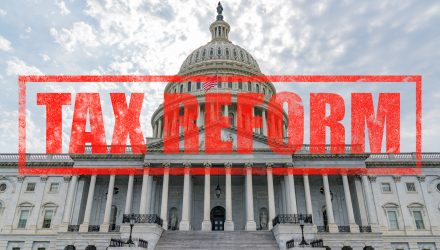Multi-national technology firms have largely stashed away the record overseas profits to avoid the U.S. tax rate, but the companies could soon repatriate their cash hoards and dish out dividends or add share buybacks, potentially strengthening tech-related ETFs.
The U.S. Senate has proposed a tax bill to help American companies become more competitive, cutting the corporate tax rate from 35% to 20%, allowing businesses to fully deduct business expenses, giving a 23% deduction for pass-through businesses and reducing the tax rate for historical untaxed foreign earnings from 35% to 14.5% for cash and 7.5% for non-cash assets, reports Carmine DiCesare for Factset. The tax rate for untaxed foreign earnings would be drastically reduced from its current 35% U.S. rate.
If U.S. large-cap companies with a big international footprint begin to repatriate cash, U.S. markets could experience a huge cash injection ahead. Current estimates put aggregate balance of cash held abroad by U.S. companies at $2.5 trillion as firms avoid the current U.S. tax rate.
For clues on what companies would do if they repatriated the trillions of dollars back onto U.S. soil, DiCesare argued that we should look back to 2004 for any hints since the 2004 tax holiday also allowed multi-nationals to repatriate earnings held overseas at a 5.25% tax rate.
If 2004 is any indication, repatriated cash ahead could translate to increased special dividends and share buybacks. From 2003 to 2005, 63% of S&P 500 companies raised annual dividends. In 2003, $30.3 billion in special dividends was paid to S&P 500 company shareholders. In 2004, the figure jumped to $179.4 billion, an increase of 492%. Of this $179.4 billion, $149.8 billion or 84% of dividends came out of companies in the GICS Information Technology sector.
